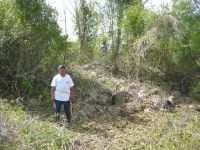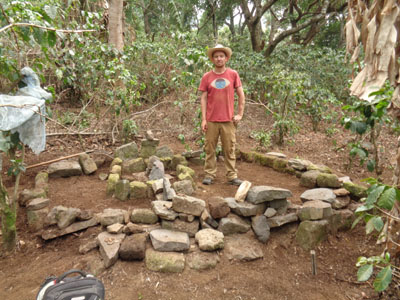Anthropological Archaeology at the University of Kentucky
The archaeology program features interdisciplinary exploration of societies from the Pleistocene to the present, with a focus on engaging and empowering contemporary communities. Faculty and affiliates conduct research in the southeastern United States, Mesoamerica, Central America, the Caribbean, South America, South Africa, the Philippines, and the Mediterranean. The collections of the William S. Webb Museum bolster research in Kentucky and the Ohio Valley more generally. Our faculty and students explore a wide range of topics, including demography, inequality, households, economy, interaction, ecology, migration, colonialism, culture contact, collective action, identity, captivity, climate change, subsistence, power, and political organization. Technological expertise includes geophysics, heritage sciences, chemical sourcing, and spatial, ceramic, and lithic analysis. We equip students to design transformative research and apply their knowledge in diverse global contexts within and beyond the academy.

Clearing a stone mound in preparation for mapping at the archaeological site of Ucí, Yucatan, Mexico. (Photo Credit: S. Hutson)
In addition to couses in the Department of Anthropology, many students take courses or seek outside committee members in the departments of Geography and Geological Sciences. The archaeology program has also recently added a full complement of geophysical instruments to aid in field research. See the corresponding technical research and teaching concentration in Archaeological Geophysics.
The William S. Webb Museum of Anthropology is also the primary curatorial facility for archaeological collections from Kentucky. While the museum contains approximately 8,000 individual collections, the largest and best known date from extensive WPA excavations in the 1930s and 1940s. Many UK graduate students incorporate analysis on materials in the collection into their thesis or dissertation research. In addition, approximately five to ten researchers per year from all parts of the U.S. and many international institutions request access to these collections to conduct bioarchaeological and artifactual analyses.

PhD Student Gavin Davies, next to a historic Mayan altar at Pan'alujaay, Proyecto Arqueologico Lago de Atitlan (PALA). Department of Solola, Guatemala. (Photo Credit: G. Davies)
Archaeology Faculty
- Renee Bonzani
Ethnobotany, South American Archaeology, Midwest and Eastern North American Archaeology, Origins of Food Production, Paleoethnobotany - Celise Chilcote-Fricker
Bioarchaeology, NAGPRA, Mesoamerica, Lower Central America, identity, embodiment of social processes - Scott R. Hutson
Mesoamerica; political and social organization, household archaeology, statistics, identity, practice theory, public archaeology, soil chemistry - Richard W. Jefferies
North American midcontinent; exchange and interaction, social networks, lithic analysis, the emergence of cultural complexity, cultural ecology, prehistoric hunter-gatherers of the North American midcontinent, mission period archaeology of the Georgia coast - Shannon Plank
Ancient Mesoamerica and the Maya, epigraphy, ceramics, Plains Indian cultures - Christopher A. Pool
Mesoamerica; evolution of complex societies, political and economic archaeology, ethnicity, cultural ecology, ceramic analysis, archaeometry, geoarchaeology - Hugo Reyes-Centeno
Evolutionary mechanisms that produce the anatomy of humans today and in the past. Heritage conservation, digital research, teeth, bioarchaeology - Elena Sesma
Historical archaeology, cultural heritage, collective memory, archaeological ethnography, public and community archaeology, African Diaspora, The Bahamas, slavery and emancipation.
Selected Graduate Courses
Required
- ANT 610 - History of Anthropological Theory
- ANT 650 - Theory in Archaeology
- ANT 651 - Archaeological Data Analysis
- ANT 662 - Research Design
Other
- ANT 555 - Archaeology of Eastern North America
- ANT 580 - Advanced Topics: Archaeological Geophysics
- ANT 652 - Demographic Archaeology
- ANT 653 - Prehistoric Economics
- ANT 654 - Archaeology of Political Systems
- ANT 770 - Topical Seminar: Ethnoarchaeology
- ANT 770 - Topical Seminar: Geoarchaeology
- ANT 770 - Topical Seminar: Hunter-Gatherer Societies
- ANT 770 - Topical Seminar: Emergence of Cultural Complexity
- ANT 770 - Topical Seminar: Mississippian Chiefdoms
- ANT 770 - Topical Seminar: Middle Range Societies of Eastern North America
- ANT 770 - Topical Seminar: Archaeology of Identity
- ANT 770 - Topical Seminar: Space Place and Landscape
Selected Research Programs
- Green River Human Paleoecology Project (Kentucky)
- Mammoth Cave Archaeological Project (Kentucky)
- Research collections of the WPA archaeology program in Kentucky
- Sapelo Island Mission Period Archaeology Project (Georgia)
- Tres Zapotes Archaeological Project (Veracruz)
Research Sponsors Have Included
- Earthwatch Institute
- Institute of Museum and Library Services
- Kentucky Heritage Council
- National Geographic Society
- National Park Service
- National Science Foundation
For further information on the archaeology program and the Department of Anthropology, please contact any of the archaeology faculty or call 859-257-2710.
